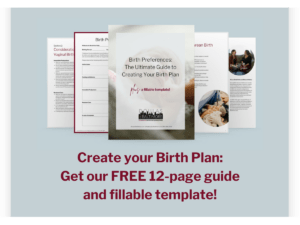Here’s a scenario that’s all too familiar among parents of newborns: after 40 weeks or so of the excitement and tribulations of pregnancy and labor, you are finally home with your long-awaited bundle of love. You’re trying to settle in and it seems like you are surrounded, as Maggie Rogers sings, “with everyone around me saying ‘You must be so happy now’.” But rather than feeling happy, you are frequently miserable, or overwhelmed, or having second thoughts about this invader in your home. So why aren’t you happy? What’s wrong with you, or with your partner, that you aren’t feeling the glow?
Welcoming a new human to your family is a monumental change, especially if it’s your first child (though these feelings are in no way limited to parents who have given birth for the first time.) Bodies need recovery time, hormones are wacky, questions and worries abound, and sleep is hard to find. It’s an easy recipe for a stew of sadness and difficulty, so no parent should ever feel any shame about being less than ecstatic in this time of expected joy.
Baby blues or postpartum depression?
The majority of newly postpartum parents experience what’s known medically and commonly as the “baby blues.” Most often experienced by the person who gave birth, it may be felt by any parent, and typically shows up within a few days after their newborn. It can easily be misinterpreted as postpartum depression, which lasts longer and has more serious symptoms (for a quick explanation of the difference by the Mayo Clinic, watch this one minute video). For more detailed information on recognizing postpartum depression, read the Mayo Clinic’s patient care page; if you suspect you may have postpartum depression, please contact your medical provider as soon as you are able.
The American Pregnancy Association has an excellent article exploring the symptoms of the baby blues. Postpartum doulas are familiar with and trained to help parents grappling with the baby blues, and our clients at Doulas of Baltimore find that having the extra hands to help and wisdom to guide can help them through these weeks of changing emotions, duties, and family dynamics. The most important thing you can do is find a way to practice self-care, which may sound impossible during this time! But even a few quiet moments each day for yourself can make a big difference, whether it’s a full meal, a walk outside, or a few minutes of meditation.
Getting through wintertime with a new baby
Baby blues can strike especially hard during the winter; indeed, many of the symptoms feel the same as those of Seasonal Affective Disorder, and the coping mechanisms look similar. Light is so important for all of us during the winter! Newborns do not need a dark room to sleep, and letting them sleep in full light during the day helps regulate their circadian rhythms, so keep the sunlight coming in during the day as much as you can. Pull a comfy chair over to a sunny window during feeding times and soak it in. Grab yourself a tall glass of water while you’re at it, because hydration is your best friend (fruit-infused water feels luxurious and festive, so pop in a slice of orange or some cranberries or cucumber if you’re able).
The optimal sleeping temperature for babies, by the way, is between 62 and 68 degrees, so cuddle up in cozy blankets and slippers and wrap yourself in warmth, rather than upping the thermostat. And don’t be afraid to get outside in the cold weather! Getting some fresh air into your lungs feels invigorating, and interacting with nature has proven emotional and physical benefits. Wrap yourself up, either with or without baby, and see the sights and smell the smells.
Healthy foods and a pretty table
- Eating well is a cornerstone of recovery during the postpartum period, so enlist whatever help you can to make that happen.
- Grocery delivery, meals from neighbors, partners who put in the time in the kitchen, and a rejection of new parent martyrdom are all helpful strategies to make sure you’re getting nutritious food into your belly.
- Sugar and yeast are dysfunctional partners, so try to limit how much of it you eat and drink.
- If you have a whole chicken, a bottle of barbecue sauce, and a crockpot, you have a meal waiting for you.
- A bag of clementines helps your vitamin intake and your bathroom output, and looks pretty in a bowl on your table. Pretty things are important to your outlook and should not be dismissed during these weeks!
- Speaking of…Fresh flowers from Trader Joe’s can be had for $5 and look lovely on your bedside table.
Be sure to prioritize couple time
If you have the support of a partner at home, use them as much as you can, and recognize that the struggle is real for them, too. This period is rife with stress and changing couple dynamics, and it may be a time to waive the “never go to bed angry” rule for a bit, if you employ it. Keep talking, keep granting amnesty for minor infractions, and keep the faith that this time will sort itself out. Couples often have trouble asking for what they need, but this is a perfect time to start. One thing you will probably need is time alone without the baby, even if it’s just a quiet candlelit bath or an hour to grab coffee with your mom. Plan for it and insist on it, even if the exact timing has to be altered because of your baby’s needs.
The baby blues can feel endless, but will become a blip on your memory timeline as the weeks pass and your body and emotions adjust to your new family reality. Again, if the blues don’t pass within a few weeks, please talk to your provider about the possibility of postpartum depression. Like most phases of infant life, the blues fade away and something new to focus on and master comes along. Love yourself, care for yourself, and allow yourself to be cared for! Journal your feelings, take your feelings for a walk, and acknowledge them as valid and normal, and you should find that all will be well.


